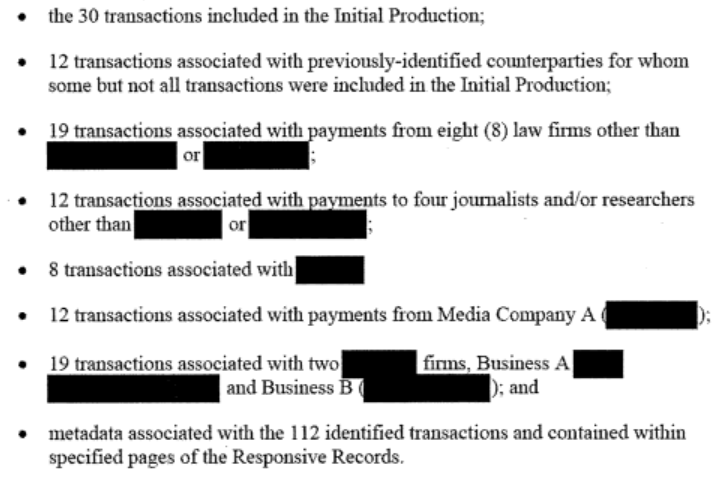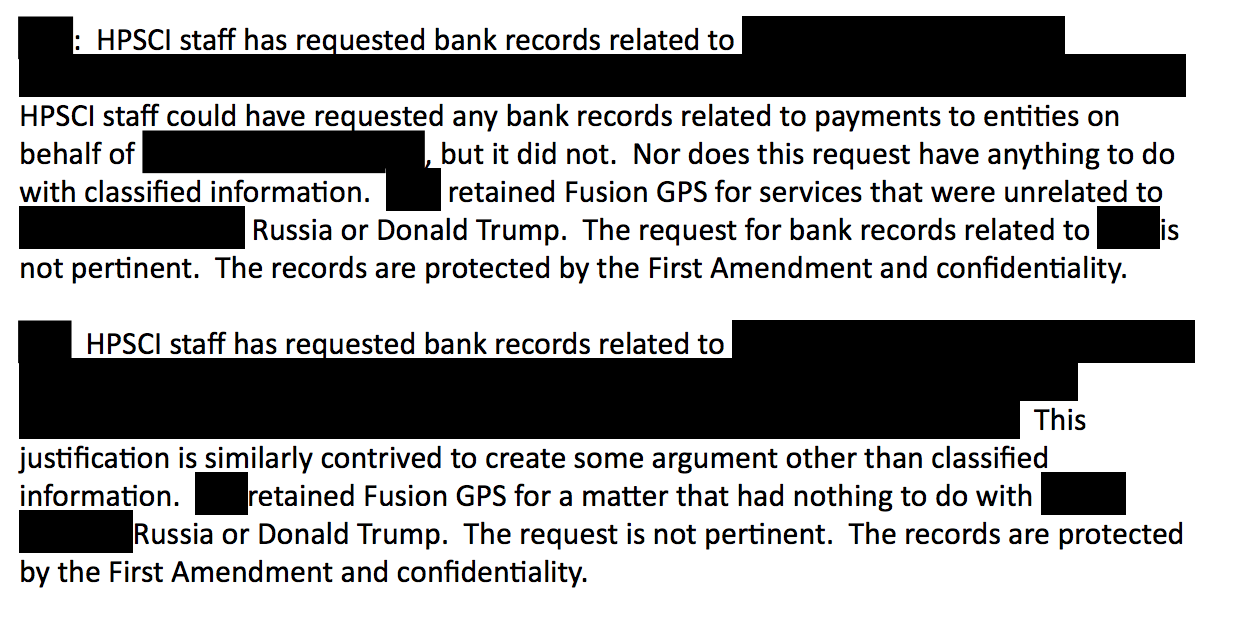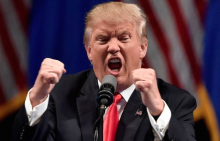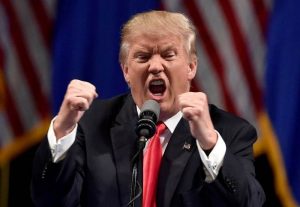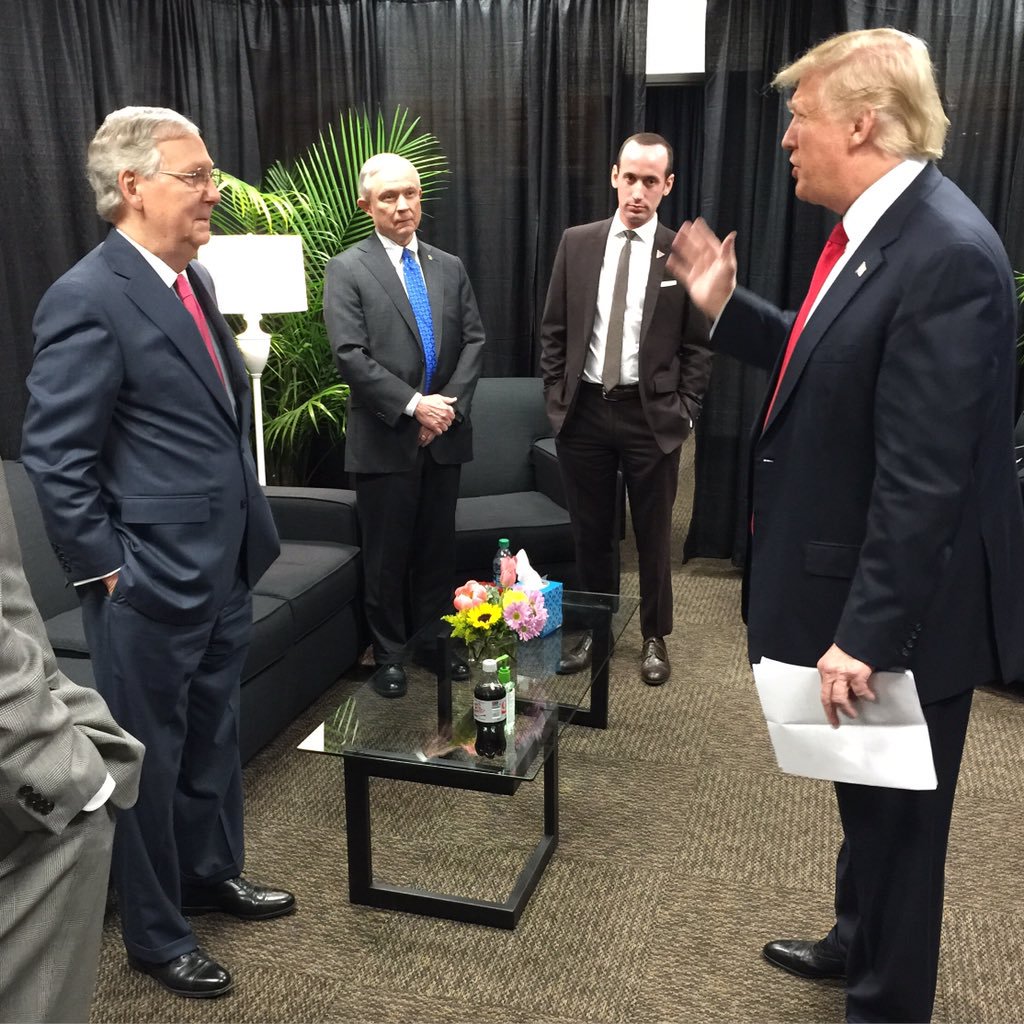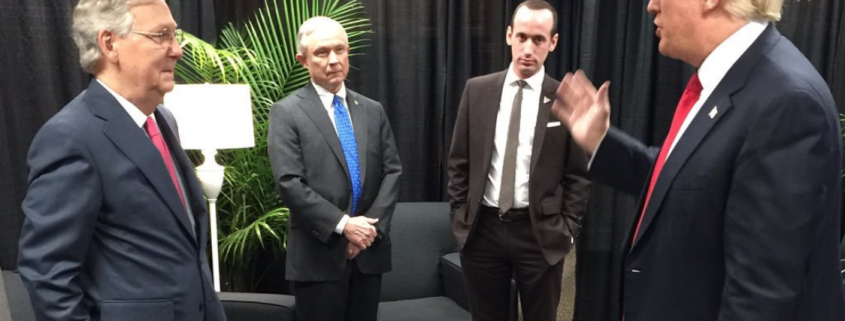Does the Fusion Ledger Explain Why They’ve Pled the Fifth?
When the first two Fusion employees, Peter Fritsch and Thomas Catán, testified before the House Intelligence Committee on October 18, they pled the Fifth. I’ve been wondering since then what basis they had to do so — as have the House Intelligence Committee lawyers fighting with them to obtain bank records related to their Russian related activities last year and this. Indeed, HPSCI suggests the invocation of the Fifth suggests there may be relevant and important materials still to hand over.
It logically follows either that Plaintiff’s principals may have been perjuring themselves when they testified to a purportedly good-faith belief that their answers would tend to incriminate them, and/or that they are in possession of incriminating information of relevance to the Committee’s investigation that they have not yet disclosed.
In my last post, I noted that the House Intelligence Committee believes Fusion GPS, the intelligence firm behind the dossier, paid three or four journalists (actually, two or three journalists, plus someone who has served as a source for such information), and is trying to get records pertaining to other law firms and two businesses as well.
Looking at the exhibits Fusion submitted, however, at least suggests what they might be trying to hide.
The interesting exhibits are:
- A ledger of the transactions HPSCI is seeking
- HPSCI’s justification for asking for documents
- Fusion’s objections to releasing the documents
Here’s what, taken together, we learn about the 112 transactions HPSCI is trying to access but Fusion is trying to hide. The HPSCI filing describes them this way:
30 + 12 transactions associated with those who worked on the Steele or Prevezon projects
The filings make clear Fusion originally turned over 30 transactions. They are bolded in the ledger, which include:
- Transactions 5-11 (7 total) totaling $523,650.62 dated March 7, March 18, August 18, September 6, October 27, October 31, and October 31 (again) 2016 which are Baker Hostetler payments associated with Prevezon
- Transactions 46 (dated June 28), 48 (dated September 8), and 51 (dated November 2) paid to someone whose redacted name is of a length that it might be Rinat Ahkmetshin (3 total transactions)
- Transactions 77-81 (5 total) dated July 13, August 2, September 1, October 5, November 1 paid to a Russian expert with a short name [see the HPSCI justification page 5]; this may be Steele
- Transactions 83-88 (5 total) which are payments to someone else dated August 16, October 5, November 1, November 2, January 5, 2017
- Transactions 89-95 (7 total) which are payments from Perkins Coie dated May 24, July 15, July 29, August 31, September 30, October 28, and December 28
- Transactions 96-98 (3 total) which are payments to someone with a relatively short name dated August 11, September 2, and October 5
There are also 12 other transactions associated with people involved in those original transactions. They include:
- A credit (Transaction 40) totaling $20,000 paid to Baker Hostetler on December 13, 2016
- 7 payments associated with the redacted name person in 2, above, dated March 11, March 22, August 23, October 4, November 1 (which is listed as the same Bates stamp as one disclosed already), December 27, 2016 and January 5, 2017
- 3 payments paid to the Russian researcher with the short name in 3, above, dated March 22, April 6, and May 25
- A credit dated May 11, 2016 from the redacted name in 4, above
Comments:
There are four items of particular interest, here (before you get into coincidental dates).
First, the Russian expert with the short name is probably Steele (unless bullet 4 is him). If so, Fusion turned over payment information tied to the DNC work, but not payment information for something else (three payments in March through May) before the DNC came in. That may be stuff associated with Beacon’s funding of the earlier Trump dossier. Or it may be something else.
Second, Perkins Coie’s payments seem to track when the Trump reports come out. Except there is one payment for $58,669.00 (a curiously even number) in late December, after the last and most inflammatory Russian related report comes out on December 13. Admittedly, by report number, there are 31 reports between the October 19 and December 13 report publicly released, but the October 28 Perkins Coie payment of $365,275.33, by far the largest, would seem to pay for that. This suggests it is likely that Perkins Coie continued to pay for the dossier even after Trump won, contrary to what these entities have said in sworn declarations elsewhere. Given reports of John Podesta meeting with Christopher Steele after the election, I think that quite possible that Democrats paid for that last report.
Third, there is no payment even remotely associated with Baker Hostetler around the time of the Trump Tower meeting. There’s a March 18 payment and an August 18 one. This, in spite of the fact that Fox reported that Natalia Veselnitskaya met with Fusion both before and after the June 9, 2016 Trump Tower meeting.
But there is a payment — which Fusion says is not related to Prevezon or DNC — to the person with the name of the length of Rinat Akmetshin, on June 28. I asked in September who paid Akhmetshin to be at that Trump Tower meeting. Is that the June 28 payment? If so, who paid for him to be at that meeting?
19 transactions pertaining to 8 law firms
Then there are the payments pertaining to 8 law firms. The HPSCI justification says those are:
- Transactions 1-3 (3 total), dated March 11, March 23, and August 17
- Transaction 17, dated February 12
- Transaction 65, dated June 6
- Transaction 67, dated March 30
- Transaction 70-73 (4 total), dated June 10, July 6, September 28, 2016, and February 17, 2017
- Transaction 88, dated May 10
- Transactions 99-105 (7 total), dated June 10, July 29, August 31, October 13, November 29, December 15, January 11
- Transaction 106, dated September 13
We have no idea what these are, and Fusion may well be correct saying this is just investigative work for real cases. Mind you, HPSCI has said it has classified information to justify some of these requests (not necessarily limited to the law firms). So I think it is worth noting.
8 transactions probably associated with Beacon
The HPSCI filing (paragraph 26) makes it clear they’re trying to get the payment information associated with Beacon, which reportedly paid for the Republican side of the dossier. The only otherwise unaccounted for 8 Transactions are 54-61, which suggest those are the Beacon transactions. The HPSCI justification backs this, as it says the committee seeks to investigate a public claim (as they note, Beacon has confirmed its role in paying for the dossier). Except that produces some really weird dates: March 31, June 7, July 12, September 30, October 17, November 30, 2016, and January 4, February 15, 2017.
Those dates don’t make sense at all (because we were led to believe the Republican sponsored research started earlier than February), and they go well beyond the time the Republicans were said to have stopped paying.
12 credits probably associated with a media outlet, possibly Yahoo
As noted, the HPSCI filing suggests there are payments from (not to) a media company, which might be Yahoo.
As Mr. Steele has acknowledged in other dossier-related litigation, in addition to sharing memos comprising the dossier with Mother Jones, in fall 2016 he met with at least five major media outlets at Fusion GPS’ direction. Those outlets included Yahoo News, which on September 23, 2016, reported purported meetings between Trump campaign advisor Carter Page and specified high-ranking Russian officials, attributed to a single “well-placed Western intelligence service.” Substantively similar allegations were contained in the dossier. Given Fusion GPS’ demonstrated patter of dossier-related engagement with media outlets, the Requested Records include records from [line and a half redacted].
Those appear to be transactions 32-43, dated pretty much monthly: February 17, March 21, April 19, May 18, June 15, July 20, August 17, September 19, October 19, November 16, December 14, 2016 and January 8, 2017, though they clearly track the election and transition time frame.
Business A transactions
Then there are two businesses. Those appear to be Transactions 12-16, which are payments on June 9, June 23, October 16, November 14, 2016 and January 26, 2017, and Transactions 18-31, which are mostly monthly payments from February 2016 to February 2017, though with some odd bunching during summer 2016. Both Business A and B are likely lobbying firms — see the redaction in the filing:
Business A appears to work on Ukrainian issues, as a footnote justifying its inclusion describes Trump’s shift on Ukranian policy.
The hacked documents would be in exchange for a Trump Administration policy that de-emphasizes Russia’s invasion of Ukraine and instead focuses on criticizing NATO countries for not paying their fare share – policies which, even as recently as the President’s meeting last week with Angela Merkel, have now presciently come to pass.”).
But that’s recent representation — “since January 2017.”
Business B transactions
Business B represents a variety of interests, but one of them is the kind of business that got mentioned in the Steele dossier as potentially colluding with Trump.
The “Steele Dossier” directly implicates [redacted] in potential collusion between the Trump campaign and Russia;
Both these businesses appear to have names that can be referred to as a short acronym.
Journalist (and other) transactions
There are three journalist transactions (besides those tied to Yahoo and Beacon):
- Transactions 62-64, payments dated May 16, June 9, and September 6
- Transactions 68-69, payments dated June 15 and August 26
- Transactions 107-112, payments dated September 1, October 25, November 14, December 2, January 9, February 2
Then there is this:
- Transaction 66, a payment dated December 12
This is not a payment to a journalist, per se, but to “individuals on [sic] have contributed to press stories on Russian issues relevant to its investigation.” This last payment, generally treated in the “journalist” category, appears to be tied to someone being quoted in the press, not writing their own work.
It’s interesting because this payment happens in the time period when the last, allegedly free report was being prepared.
Update, 12/12/17: The researcher with the short name may be Nellie Ohr, the wife of a DOJ official who was in the loop on the dossier.


